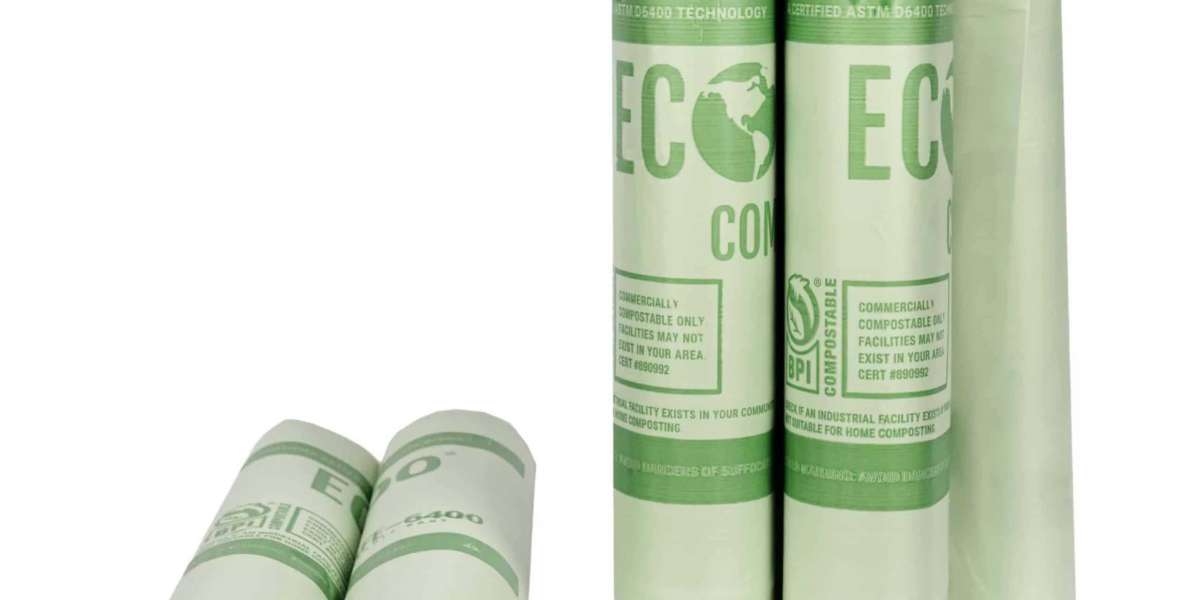Garbage bags are an essential tool in our daily lives, but have you ever wondered about the impact they have on the environment? Traditional plastic garbage bags take hundreds of years to decompose, contributing to pollution and harming wildlife. Fortunately, biodegradable garbage bags offer a sustainable waste solution that not only reduces environmental impact but also provides convenience and durability. In this blog post, we will dive into what biodegradable garbage bags are, how they work, their benefits and drawbacks so you can make an informed decision when it comes to your waste management practices.
What are biodegradable garbage bags?
Biodegradable garbage bags are a type of waste disposal bag that is designed to decompose naturally in the environment. Unlike traditional plastic bags, biodegradable garbage bags are made from materials that can break down over time without leaving harmful residues behind.
These eco-friendly garbage bags come in various sizes and thicknesses to accommodate different types of waste. Some manufacturers use plant-based materials such as cornstarch, vegetable oil, or potato starch to create their products while others utilize advanced technology to produce plastics with enhanced biodegradability.
The decomposition process for these bags works by breaking down the molecular structure of the material into smaller pieces through natural bacterial activity. This results in non-toxic residues that return back to nature within a short period.
It's important to note that not all biodegradable garbage bags are created equal. Some may take longer than others for complete decomposition depending on factors such as temperature and humidity levels. Additionally, some landfill sites may not have specific conditions required for these bags' proper breakdown.
Biodegradable garbage bags offer a sustainable solution for homeowners looking for an alternative option when it comes to managing their household waste while minimizing environmental impact.
How do biodegradable garbage bags work?
Biodegradable garbage bags work through a process called biodegradation. This means that the materials used to make these bags can be broken down by natural microorganisms, such as bacteria and fungi, into smaller components over time.
The primary material used in making biodegradable garbage bags is usually plant-based, such as corn starch or sugarcane. These materials are renewable and sustainable compared to traditional plastic bags made from non-renewable resources like petroleum.
Once disposed of in an appropriate environment, such as a compost bin or landfill with adequate oxygen levels, the bag will begin to break down naturally. The microorganisms present in the soil or compost will consume the organic matter in the bag until it eventually decomposes entirely into carbon dioxide (CO2), water (H2O) and biomass.
It's essential to note that not all biodegradable garbage bags are created equal. Some may require specific conditions for decomposition while others may take longer than advertised if not exposed to ideal conditions. Therefore, it's important always to read labels carefully before purchasing a particular brand of biodegradable garbage bag.
Using biodegradable garbage bags is an excellent way to reduce your environmental footprint while still being able to dispose of waste properly. By choosing eco-friendly alternatives like these sacks instead of traditional plastic ones can help minimize pollution significantly and promote sustainability efforts worldwide!
What are the benefits of using biodegradable garbage bags?
Biodegradable garbage bags are a sustainable alternative to traditional plastic bags. These eco-friendly bags offer numerous benefits over their non-biodegradable counterparts, making them an ideal choice for waste management.
One of the primary advantages of using biodegradable garbage bags is that they reduce the amount of plastic waste ending up in landfills and oceans. Unlike regular plastic bags, which can take hundreds or even thousands of years to decompose, biodegradable bags break down much faster through natural processes.
In addition to being better for the environment, biodegradable garbage bags also help protect human health by reducing exposure to harmful chemicals found in traditional plastics. These chemicals can leach into food and water supplies when disposed of improperly.
Another benefit of using biodegradable garbage bags is that they are more durable than traditional plastic bags. They can hold heavy loads without tearing or leaking, making them suitable for use in households and commercial settings alike.
Using these eco-friendly options helps promote sustainability practices within businesses and communities. It encourages people to be mindful about their environmental impact and take steps towards protecting our planet's future.
Opting for biodegradable garbage bag solutions offers many benefits such as reducing pollution levels while promoting sustainable living amongst society members!
What are the drawbacks of using biodegradable garbage bags?
While biodegradable garbage bags are an eco-friendly alternative to traditional plastic bags, they do come with some drawbacks. First and foremost, not all biodegradable bags are created equal. Some may break down faster than others depending on the materials used in their production.
Another drawback is that biodegradable bags require specific conditions to decompose properly. They need a certain level of heat and moisture, which may not always be present in landfills or compost bins. If these conditions are not met, the bag may take just as long to decompose as a regular plastic bag.
Moreover, the cost of biodegradable garbage bags can also be a disadvantage for some people. They tend to be more expensive than traditional plastic bags due to the additional costs associated with producing them using sustainable materials.
There is still debate over whether or not biodegradable plastics actually help reduce environmental impact overall. While they do eventually break down into natural elements like carbon dioxide and water without releasing harmful chemicals into the environment during decomposition, some argue that their production still involves emissions and energy consumption.
While there are certainly benefits to using biodegradable garbage bags when it comes to reducing reliance on traditional plastics and decreasing waste in landfills if you're considering making the switch it's important to weigh up both sides before making your decision!
Conclusion
Biodegradable garbage bags are a great solution for those who want to reduce their environmental impact. These bags break down naturally over time, reducing the amount of plastic waste that ends up in landfills and oceans.
While there are some drawbacks to using biodegradable garbage bags, such as higher cost and limited availability, the benefits outweigh these concerns. By choosing to use biodegradable garbage bags, you can make a positive difference in the world by helping to protect our planet for future generations.
So next time you need to dispose of your trash, consider using a biodegradable option. Your small action can have a big impact on the environment!








